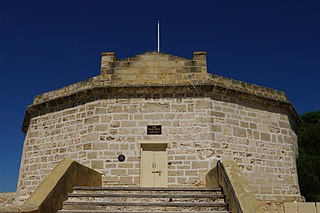
The Round House was the first permanent building built in the Swan River Colony. Built in late 1830 and opened in 1831, it is the oldest building still standing in Western Australia.

Castlereagh Street is a 1.6-kilometre-long (0.99 mi) major street located in the Sydney central business district in New South Wales, Australia. The street runs in a north-to-south, in a one way direction only.
Australian non-residential architectural styles are a set of Australian architectural styles that apply to buildings used for purposes other than residence and have been around only since the first colonial government buildings of early European settlement of Australia in 1788.

George Thomas Temple-Poole was a British architect and public servant, primarily known for his work in Western Australia from 1885.

The Fremantle Markets is a public market located on the corner of South Terrace and Henderson Street, Fremantle, Western Australia.

Old Perth Fire Station is located at 25 Murray Street, at its intersection with Irwin Street, in Perth, Western Australia.

The Old Fremantle Police Station and Court House Complex is a heritage-listed group of buildings located at 45 Henderson Street, Fremantle, Western Australia. The complex includes the former courthouse, police station, police barracks and lock-up and artillery drill hall.

Customs House and former Falk & Company Warehouse is an historic three-storey brick building located in Fremantle, Western Australia. The building has a number of prominent ornate façades on Phillimore Street between Henry and Pakenham Streets. It houses the Fremantle regional office of the Australian Customs and Border Protection Service, Centrelink, and a number of other Australian Government offices.
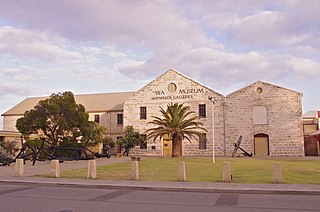
The Commissariat Buildings are a group of two buildings found at 6 Marine Terrace in the West End of Fremantle, Western Australia, which, with construction having begun in 1852, are one of the first sites built using convict labour in the Swan River colony.
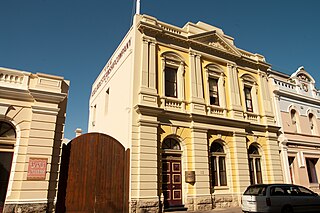
The Adelaide Steamship House is located at 10-12 Mouat Street, Fremantle. Built in 1900, the building was designed by Fremantle-based architectural firm Charles Oldham and Herbert Eales and was constructed by C. Coghill. The building takes its name from the original owners of the building, the Adelaide Steamship Company, who provided sea passenger and freight services around Australia.

The Orient Hotel is on the corner of High and Henry Streets in Fremantle, and was designed by Michael Cavanagh. Built by Atkin and Law in 1902/03, the building was owned by Thomas O'Beirne. Since it was built it has continued to be a hotel though it has had a number of proprietors including the Parry family from 1923 to 1971. Restoration works have been carried out on the building a number of times. Extensive works in 1995 included the replacement of the two story verandas.
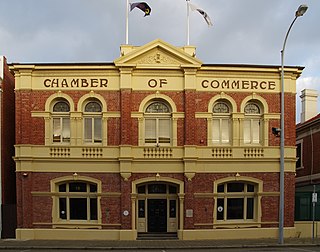
The Fremantle Chamber of Commerce is a business and commerce advocacy association in Fremantle, Western Australia.

The Strelitz Buildings, located at 30 Mouat Street, Fremantle, were built in 1897 for Paul and Richard Strelitz. In October 1994, the buildings were permanently listed on the Western Australian State Heritage Register.

Mouat Street is a 300-metre-long (980 ft) street in Fremantle, Western Australia. Historically, the name was often spelled as Mouatt Street.
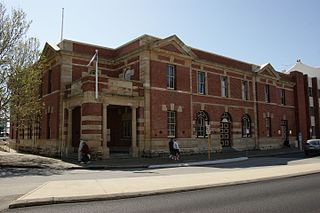
The Old Customs House is a building in Fremantle, Western Australia that was built in 1908 to house the main branch of the Customs Department of Western Australia. It is one of only a handful of extant Customs Houses in the state; others are in Albany, Broome, Cossack, and Geraldton.
Michael Francis Cavanagh was an Australian architect, primarily known for his work in Western Australia from 1895 to the late 1930s.
Cavanagh and Cavanagh was an architectural partnership in Australia, active in both Western Australia and Queensland. The partners were brothers Michael Cavanagh and James Cavanagh.
Cliff Street is a street in Fremantle, Western Australia. It is the furthest west cross street on High Street, running parallel to Mouat Street. It is also at the south western edge of University of Notre Dame campus buildings. It is part of the Fremantle West End Heritage area, which was established in late 2016.

Phillimore Street is a street in Fremantle, Western Australia; it runs between Queen Street, outside the Fremantle railway station and Cliff Street.

Fremantle West End Heritage area is a designated heritage precinct in Fremantle, Western Australia.

















